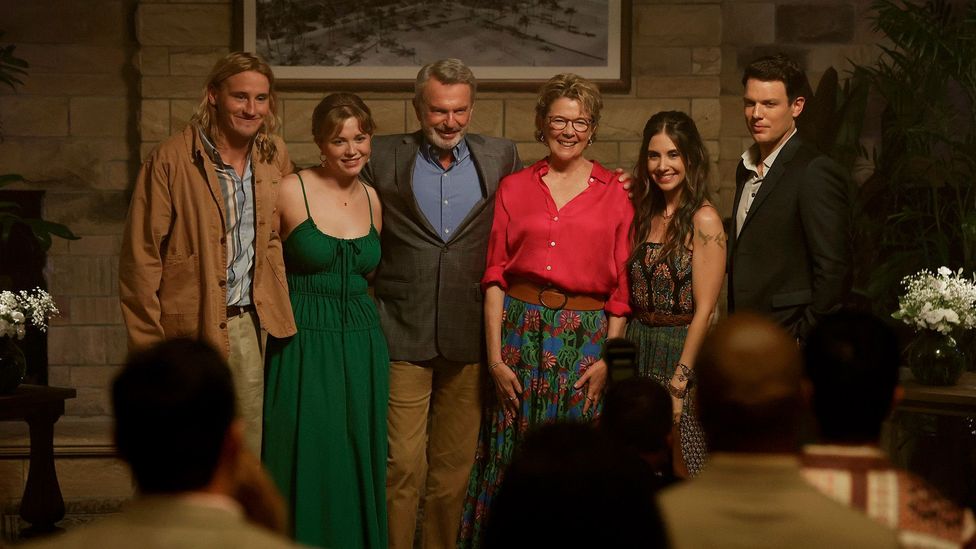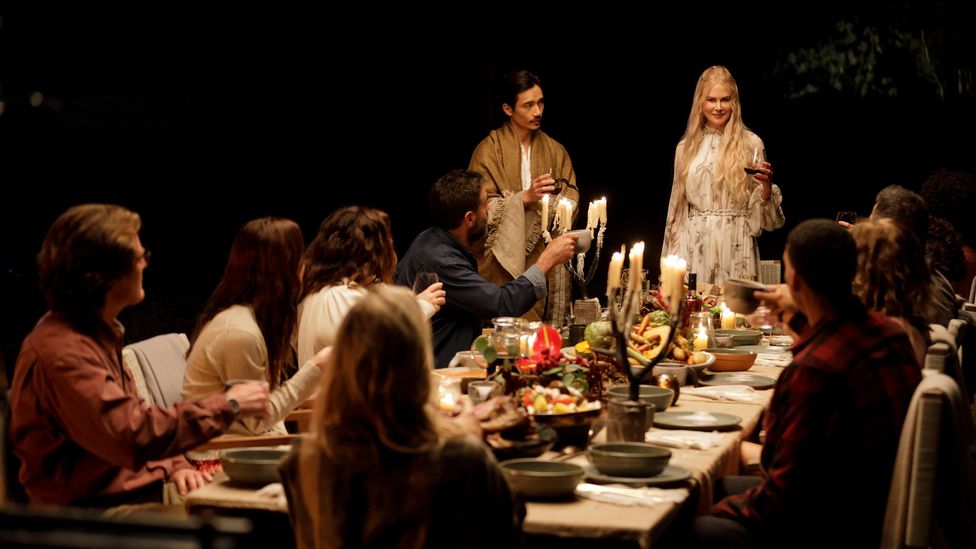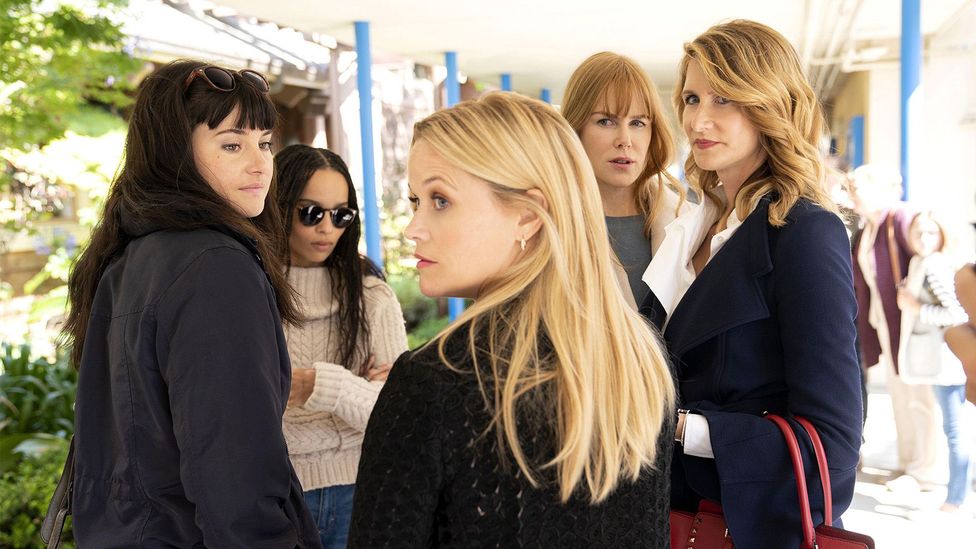Liane Moriarty is living out an author's dream. The Australian novelist has written nine books and each and every one of them has been optioned for film or TV adaptation. In 2017, HBO's Emmy-winning Big Little Lies was the first to make its way to audiences and to roaring success: the ensemble series starring Reese Witherspoon and Kidman was a smash hit that studios are still scrambling to recreate to this day.
In the years since, two more TV shows based on Moriarty novels have been released into the world: 2021's Nine Perfect Strangers on Hulu, a psychodrama set in a wellness spa and once again starring Kidman as an enigmatic lifestyle guru; and, just this month, Apples Never Fall, a Peacock series about a dysfunctional, wealthy family of star tennis players featuring Annette Bening, Sam Neill, Jake Lacy and Alison Brie.
At a glance, you'd assume that it was the success of Big Little Lies that led to the buying frenzy for Moriarty adaptation TV rights. But that's only partially true. Moriarty first had a novel optioned four years before Big Little Lies' release: The Husband's Secret had the film rights picked up in 2013 just months after topping the New York Times bestseller list. Her 2009 novel What Alice Forgot was optioned in a pre-Big Little Lies world too, with Sony's TriStar acquiring the title in 2014. While the charismatic "Monterey Five" undoubtedly pushed Moriarty to the forefront of audiences' – and studio execs' – imaginations, there was something in Moriarty's work that made her novels an especially compelling pick to show on screen.
"Her books are so ripe for adaptations," Rachel Miller, a founding partner at production and talent management company Haven Entertainment, tells BBC Culture. "She writes amazing, complex, three-dimensional, juicy characters – roles any actor would jump at the chance to play."
Post-Big Little Lies, Moriarty's works escalated from merely popular to sparking all-out bidding wars. Her two novels published since the show's release – Nine Perfect Strangers and Apples Never Fall — were optioned for television months before they even hit shelves, a decisive demonstration of Hollywood's faith in Moriarty as a hit-maker. Each of her previously published novels was picked up for adaptation, too, as studios and creatives alike stepped up their eagerness to interact with Moriarty's material.
Why right now is TV's 'Moriarty moment'Moriarty's novels, while compelling on their own, don't exist in a vacuum. They coincided with a few key industry factors that made her novels perfectly suited for this moment in television history. The last five years have been a golden age of book-to-TV adaptations, with series such as The Handmaid's Tale, Bridgerton and Big Little Lies all logging record-breaking viewership numbers and dominating the cultural conversation week after week.
Studio executives have taken notice: In 2019, Publisher's Weekly reported that Netflix was on a "book-buying spree"; in 2020, according to The Atlantic, planned TV adaptations exceeded film adaptations for the first time ever. This resulted in what author and screenwriter Daniel Torday calls "an absolute explosion" of new television content – much of it based on new literature.
"In 2015, I think there were maybe 100 original television series being created at any point. Last year, it was more like 500," Tordray, whose own novel is currently in development with End Cue Productions, tells BBC Culture. And the kinds of shows being made are changing, too.

Apples Never Fall is the latest TV adaptation of a Liane Moriarty novel, featuring Annette Bening, Sam Neill, Jake Lacy and Alison Brie (Credit: Peacock/Getty Images)
"The sort of 'you must be able to pick up one episode' episodic [structure] is out the window. Viewers are much more willing to be involved in multiple plotlines, multiple points of view. People feel like they can do more."
Enter: Moriarty, whose nine novels are a case study in propulsive, multiple-perspective multiple-timeline dramas that unfold with care. Moriarty's novels are structured perfectly for modern TV audiences' interests, a distinction she shares with contemporaries such as Sally Rooney, Celeste Ng and Taylor Jenkins Reid, each of whom deals heavily in multiple perspectives and timelines, and each of whom has had the TV rights acquired for back-to-back projects.
These authors are experts at weaving in a multilayered world that requires time – say, eight to-ten one-hour episodes – to fully expand, and each share a few other themes, too, such as deep dives into the emotional waters of complicated women and backgrounds of extreme wealth.
Where Apples Never Fall falls shortFor some, it's exactly this dedication to theme that made the most recent adaptation of Moriarty's work, Apples Never Fall, difficult to enjoy. New York Times television critic Margaret Lyons wrote that Apples Never Fall is "the third Liane Moriarty book to be adapted for television" – "but if you told me it was the 10th, I'd believe you, given how familiar it all feels". Rolling Stone's Alan Sepinwall wrote that "the approach is similar" to Big Little Lies, but that " "those elements just don't mix nearly as well". "Surprise!" Coleman Spilde wrote for The Daily Beast. "Bet you didn't guess that this family has some dark hidden secrets."
Judy Berman, TIME's TV critic, attributes the difference in reception to Apples Never Fall (and Nine Perfect Strangers, whose reviews fell somewhere between the glowing elegies to Big Little Lies and the decidedly lukewarm takes on Apples Never Fall) to a simple difference in the quality of storytelling.
"The most important difference is that Big Little Lies had something smart and observant to say about families, abuse, and solidarity among women," Berman tells BBC Culture. "By contrast, Nine Perfect Strangers ended up feeling pretty pointless, while Apples Never Fall hit viewers over the head with its message to such an extent that the plot became too predictable."
Will there be another Liane Moriarty TV adaptation?Whether or not fans felt the same fatigue with Apples Never Fall as critics did, the Moriarty adaptation train isn't stopping. And maybe the best thing that TV creators and studio executives can do right now is take a careful look at what made Moriarty a goldmine to begin with – and what rang less true in subsequent adaptations.
There have always been authors whose works inspire a long list of film or TV versions, Berman says, pointing to writers such as John Grisham and Stephen King, but "what's worrisome is when the hype around a big-name author results in a rush to crank out adaptations without adequate attention to quality".
For Miller, Moriarty's enduring appeal will always come back to her characters — and from a Hollywood perspective, to the talent that her characters attract.
"The trend we are really seeing is that [the book] has to have great, big, juicy characters that will attract A+ talent. If you see the stars that TV shows are securing for the adaptations – it is because these characters, based on existing IP, are incredibly rich and exciting, and having a 300+ page book as a basis of that character really allows for an actor to see just how juicy a character is and it gets that actor eager to sign on." Author Tordray agrees: "If you can attract a certain level of talented actor to take on the roles, it just lifts everything."

Moriarty's Nine Perfect Strangers was optioned for television in 2021, before the novel was even released (Credit: Hulu)
"The most important difference is that Big Little Lies had something smart and observant to say about families, abuse, and solidarity among women." - Judy Berman
There's no denying that many largely credit the success of Big Little Lies to the performances of Kidman, Witherspoon, and their co-stars – and that many actors are, in turn, exceptionally excited about the opportunity to act in roles springing from Moriarty's imagination.
In 2016, fresh off filming Big Little Lies, Kidman and Witherspoon bought the TV rights to another Moriarty novel, Truly Madly Guilty. Over the next two years, Kidman optioned two more Moriarty titles over the next few years, planning to play the lead role in both: Nine Perfect Strangers and The Last Anniversary. As of 2017, Blake Lively was attached to play the lead role in another Moriarty adaptation, The Husband's Secret, and in 2019, actress Heather Graham sold a pilot of Moriarty novel The Hypnotist's Love Story to ABC with herself in the starring role.
As long as A-list actors want to star in Moriarty adaptations, Miller contends, Hollywood will keep making them. And love it or hate it, Moriarty's influence is a rising tide, ushering in a new generation to take the crown from the Stephen Kings and Agatha Christies, the J.K. Rowlings and George R.R. Martins.
The domestic drama is having its heyday in prestige TV, a medium that finally takes its anti-hero heroines with the seriousness long afforded to Tony Soprano and Walter White. With talented, veteran female actors suddenly holding the means of production, discussions of how various Moriarty adaptations differ may miss the point. What they have in common is a role that women can sink their teeth into, a chance to be measured as more than an antihero's wife. As Moriarty's books make their way to the screen, that's one element they can't afford to lose.
--
If you liked this story, sign up for The Essential List newsletter – a handpicked selection of features, videos and can't-miss news delivered to your inbox every Friday.
If you would like to comment on this story or anything else you have seen on BBC Culture, head over to our Facebook page or message us on Twitter.
